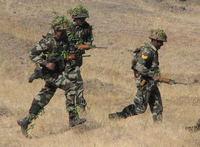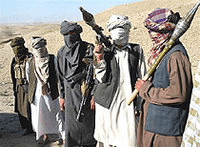In the immediate aftermath of President Obama’s announcement of an American troop increase in Afghanistan, Germany has signaled a troop increase (600 additional troops) and French planners are formulating contingencies for a troop increase (up to 800 troops) as well (both items via Secret Défense).Both moves represent token increases compared to the 17K Obama justannounced (12K in combat troops, 5K in support troops), although theFrench increase, if ultimately agreed to, would solidify an upcomingreorganization of French forces into a unified brigade. The increasesare also significant political gestures that reflect Obama’s politicalcapital here in Europe. So the Afghan “surge” is not […]
South Asia Archive
Free Newsletter
As a vocal skeptic of plans to escalate the war in Afghanistan, I should be dismayed by President Barack Obama’s approval of 17K additional troops. But for various reasons, I think it’s a smart move. His initial delay in making the announcement led me to believe that he might be having second thoughts about doubling down. But after the delay, the announcement of a very muscular increase demonstrates the kind of resolve that won’t necessarily win the war, but will allow us to eventually withdraw at a time of our choosing, rather than under duress. That’s not an insignificant gesture, […]
Is it possible we’ve actually reached the high-water mark for American forces in Afghanistan? Or is President Barack Obama simply holding the military command’s feet to the fire on approving recent troop requests to send a message? A few months ago, common wisdom seemed to have 30K additional troops penciled in for Afghanistan, with a couple brigades already inked in for January deployment. But Obama has yet to give the green light on even the two brigades, let alone the Afghan “surge” people were talking about. Part of that has to do with waiting for the outcome of the strategy […]

NEW DELHI — In the wake of last November’s Mumbai terror strikes, which revealed weaknesses in India’s homeland defense capacity, India’s inability to fight a full-fledged war is now being increasingly exposed. Years of political neglect, corruption, red tape and indecisiveness have left the Indian Army (and to some degree the Navy and the Air Force) without the wherewithal to fight a protracted war against neighbor Pakistan, let alone more powerful China. Problems with India’s defense modernization program — valued at more than $50 billion over the next five years and to include new fighter jets, nuclear submarines and war […]
A few years ago, anytime the Pakistani government negotiated some sort of ceasefire or peace agreement with extremist militants in the FATA, the Western governments fighting those same militants in Afghanistan condemned the moves as undermining efforts to stabilize Afghanistan, instead proposing enlarged military operations, complemented by targeted missile attacks from American drones, to defeat the insurgency. None of those peace deals ended up holding up, but despite limited increases in the pace of military operations, neither the FATA nor Afghanistan is any more stabilized than it was then, and arguably less so. So it’s hard to say who got […]
The U.S. government’s map of the Middle East is changing. Long dominated by the Arab-Israeli conflict, U.S. conceptions of the Middle East are drifting eastward, increasingly centering in the Persian Gulf and coming to envelop the mountains and plains of Afghanistan and Pakistan. Seen this way, the U.S. purpose in the region far transcends the need to resolve historical conflicts. The problems of the Middle East now encompass some of the most important challenges to U.S. power and influence in the world. The signs are subtle but no less clear. In his interview last month with al-Arabiya television, President Obama […]

America may not be losing the war in Afghanistan, but it is also not winning. Neither is the U.S. approach in neighboring Pakistan making friends or preventing new recruits from crossing the border to kill U.S. and other NATO troops. What then is the best way to promote peace and security in the greater South Asia region, home to nearly half the world’s population and several nuclear-armed states? The challenges involved in confronting these threats — which means fighting extremism in both countries, rebuilding governance in Afghanistan, and supporting a weak democratic government in Pakistan — dwarf the past two […]
